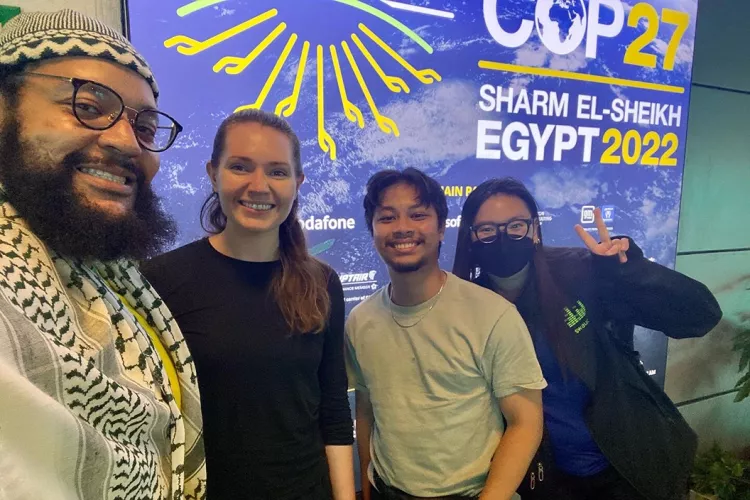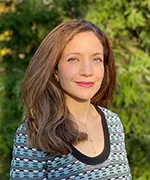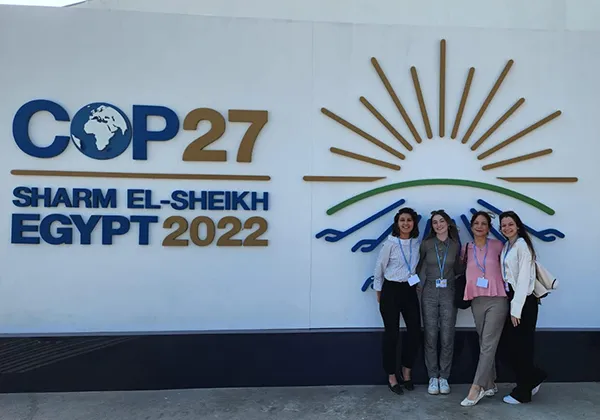Swarthmore Contingent Reflects on U.N. Climate Change Conference

Visiting Assistant Professor of Religion James Padilioni, Director of Sustainability Elizabeth Drake, Alfisyanrin Muhamad ’23, and Chris "Pixel" Stone '23.
A group of Swarthmore students, staff, and faculty attended the United Nations Foundation Climate Change Conference (COP27) in Egypt in November, witnessing and contributing to international unity against the existential threat of climate change.
Over the course of two weeks, four Swarthmore students documented the conference from multiple perspectives, including climate change policy and implementation, biodiversity and habitat protection, power imbalances between large and small nations, and the effect music makes on social movements.
Among the highlights of the experience:
- Encountering the People’s Plenary, an event at which representatives of Indigenous peoples, youth, women, people with disabilities, environmental NGOs, and climate justice activists spoke in solidarity
- Joining a protest that broke out after the People’s Plenary, with attendees from around the world marching through the halls of COP27 to sing songs calling for climate justice
- Meeting key figures of the climate change movement, including Robert Bullard, who is known as the father of the environmental justice movement
- Attending critical negotiations related to the implementation of the Paris Agreement of 2016 and the Glasgow Climate Pact of 2021 and networking with students from around the world
The College first received NGO-observer status in 2013, and has sent a delegation to each summit since, including last year. This year's trip was sponsored by Global Studies, Environmental Studies, and the Office of Sustainability.
Below, the 2022 Swarthmore contingent reflects on this year’s conference.

Anna Considine ’23, a political science and sociology & anthropology major from British Columbia, Canada
“The opportunity to witness countries from around the world coming together and trying to solve the climate crisis taught me an enormous amount about global environmental governance. I was grateful to see these efforts, not because any monumental, world-saving decisions were made, but rather because it provided me with the ability to critically witness the shortcomings of our current systems and to better understand the scope of the problems that we are facing. I feel pessimistic that real and timely change will come from conferences like COP; however, this experience gave me renewed hope in the power of people in combating the climate crisis. COP27 reaffirmed for me that the fight against climate change is being fought every day, and we do not have to wait for United Nations deliberations to reach consensus for battles to be won.”

Professor of Political Science and Program Coordinator for Global Studies Ayse Kaya (whose article on multilateral development banks and climate finance was published by the SDG Knowledge Hub, a project of the International Institute for Sustainable Development, during the conference)
“It was an incredible experience for our students, who witnessed inter-state negotiations on climate change for the first time in person. It also provided other opportunities for them, including interfacing with representatives from the non-state sector. COP negotiations can have many low moments, in which the world's lack of ambition emerges as a sad reminder of our slowness in combating climate change, even though we are skillful in rapidly exerting extensive damage to our climate and nature. Nonetheless, it was incredibly memorable to witness the negotiations with my students. This COP will be remembered for taking the initial steps to establish a loss and damage fund geared to nations most vulnerable to the climate crisis."

Climate Action Manager (Sustainability) Hannah Ulloa
“I was personally struck most by one thing: that the parallels between global negotiations and local or community-level conversations are numerous, and this is inspiring to see. To address climate change, a powerful 'threat multiplier' as Dr. Ayana Elizabeth Johnson puts it in All We Can Save, we need change happening on all scales simultaneously. While we can all acknowledge that there is still much to be done on a much more urgent timeline, my hope is that the students left with a deeper understanding of the strengths and deficiencies of current frameworks for climate action, or just social change in general, and where they can make an impact personally, academically, or professionally.”

Director of Sustainability Elizabeth Drake (who also mentioned COP27 in her remarks at the To Zero by Thirty-Five groundbreaking event on campus in early December)
“Attending COP27 as a member of Swarthmore's delegation was an incredible opportunity to get an inside look at how global climate negotiations function, which can seem very opaque from the outside. In particular, I was following the negotiations on Article 6 of the Paris Agreement, which deals with cooperative approaches to reducing emissions, primarily via carbon trading. Some of the key issues include the types of emissions reductions that should be allowed under this carbon-trading mechanism and how the system should ensure that emissions reductions are not double-counted.
On a more personal note, one of my favorite things about the conference was being surrounded by people from truly everywhere in the world — U.N. events are one of the few places where you can be in a room with someone from almost every country. It was also fascinating to hear from my fellow delegates about their experiences during the conference — with so many negotiations, side events, and pavilions, everyone was able to craft their own agenda and explore issues that they're passionate about.”

Visiting Assistant Professor of Religion James Padilioni
“I was impressed by the process. As Americans, we are steeped in a political culture that is sometimes suspicious of global confederations like the U.N. However, I found it most refreshing to be in company with folks who were all committed to the same process, regardless of the specific outcome. You could feel the solemnity to the proceedings, not only because the U.N. is the only global arbiter for the nations of the world, but because the stakes of climate change truly are that high. What happened in Sharm el-Sheikh was important, and everyone there knew that and styled themselves accordingly. With over 44,000 attendees, COP27 was a sea of people, many of whom donned their Indigenous and ritual attire. This kaleidoscope of humanity was truly a beautiful sight to behold.”

Alfisyanrin Muhamad ’23, an environmental studies major from Harrisburg, Pa.
“A large topic at this COP was climate financing focused on loss and damages. Many small nations and Indigenous peoples were pushing for climate reparations from liable developed nations for losses induced by climate change, such as from climate change-induced weather disasters. This unique experience is one that would only happen at a place like COP. It is a place where the entire world comes together to develop international environmental policy with the means of developing solutions to the climate crisis. It is a place where I was able to meet other Indigenous peoples around the world, all fighting for their voices to be heard, and share emotions of solidarity, resistance, and community. I will always be grateful for this opportunity I was given and hope to partake in global environmental engagement again in the future.”

Olivia Fey ’23, an environmental science special major from Severna Park, Md.
“I came away with what is truly a mix of emotions: hopeful yet hopeless, energized yet depleted, and all around in a state of awe of all I’d witnessed over the course of the week. When asked 'how was Egypt?' I’ve not known exactly how to respond, aside from saying that it was an absolutely life-changing experience. On the one hand, I have never been in a space brimming with so much passion and deep care for environmental issues; each day, the venue was packed with thousands of observers from other colleges, organizations, and institutions, whose passion for global collaboration on crucial climate change issues was so tangible. It was beyond empowering to see so many individuals from around the world, from different disciplines and backgrounds, flood Sharm El-Sheikh to be part of the negotiations, whether directly or tangentially. However, the strength and solidarity I felt in being among such like-minded people was met with collective frustration and pure hopelessness, as national leaders failed to deliver on such fundamental elements to combat the climate crisis.
COP has made me feel now, more than ever, that the real fight and the real solutions will come and are coming from the people — including Indigenous communities, environmental non-governmental organizations, women and gender minorities, youth populations, etc. — rather than through the COP framework. The failings of global environmental governance are what can inspire the change that the people bring forth, but otherwise, global environmental governance is moving at too slow of a pace given how rapidly and intensely our climate is changing. The people and our individual efforts are what will ultimately have the greatest impacts on combating the climate crisis.”

Climate Action Manager (Sustainability) Hannah Ulloa, Anna Considine ’23, Professor of Political Science Ayse Kaya, and Olivia Fey ’23.



